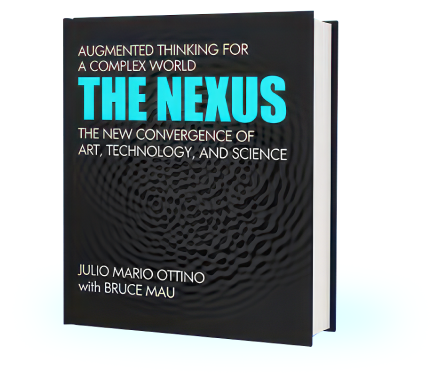When uncertainty rules, when the world around us is hard to understand and things seem incomprehensible, we turn to worldviews. A world view helps us in making sense of the world
When we published THE NEXUS, we did not present it as a worldview. But we could have done so. We put two subtitles The New Convergence of Art, Technology, and Science and Augmented Thinking for a Complex World. And we explained why we needed this. We described the world as facing enormous challenges of unprecedented complexity—problems that intertwine in a dizzyingly interconnected, interdependent, and changing landscape. And mentioned the recurrent issues that get names in survey after survey about problems affecting humanity: destruction of natural resources and climate, large-scale conflict and wars, religious fundamentalism, racial inequality, poverty, lack of education, lack of economic opportunity and unemployment, gender inequality, food and water insecurity, lack of political freedom, political instability, and—depending on who is surveyed— even the future of the global financial system. And even though we wrote the book during the pandemic, it looks like we fell short; by 2022 the World Bank’s annual report described the year as a “convergence of crises”.
So…we did not present The Nexus as a world view. But we could have done so. The convergence was how to augment our thinking space, is to have more than one lens to see the word. And the augmented thinking part was how to make solutions real by being able to implement them and this required that we understand complex systems.
We made reference to Newtonianism, still shining as a world view. It appears in current writing in political science. Seeing a political universe as self-sustaining and self-regulating objects or actors; entities which are knowable and governed by rational humans. This seems so utopic.
Other views are competing for space. Descriptions of the world and how do we feel about the world. The Cold War gave us VUCA, which stands for Volatile, Uncertain (5), Complex (65), and Ambiguous (4). And more recently, BANI, which stands for Brittle, Anxious, Nonlinear (3), and Incomprehensible. The words uncertain, ambiguous, complex, nonlinear appear repeatedly in The Nexus. We should note that nonlinear is already contained in complex. Looks to me How the world is how do we feel about the work. The problem with Newtonianism is that it is a worldview that allows for risk but leaves no space for uncertainty. And this is a problem, especially now.
We described things, we distilled plenty of advice. And then we developed two lists: The Top 10 Lessons in Creativity and Leadership and, after that, The Top Five Lessons from The Nexus in Leadership for Innovation.
A few of takeaways:
» Tolerate Tension. Tension is healthy. Embrace the beauty and excitement of ideas that oppose each other.
» Design Nexus Teams. Combine specialists with key Nexus connectors. Look at a problem through the lens of multiple disciplines.
» Embrace Fog. Answers to complex issues never appear fully formed. This is especially important in guiding teams.
» Break Assumptions. Truly new ideas break assumptions. Breakthroughs expand domains. Breakwiths create entirely new domains.
And among the top three:
» Master the Ability to Synthesize Opposing Viewpoints
» Develop Maps, but use a Compass as your Guide. Managers use maps. Leaders use a compass.
» Understand the World, Learn the Basics of Complexity
Central to the Learn the Basics of Complexity is Emergence.
Emergence is what happens when elements – “agents” in the terminology of complex systems theory – interact with each other to produce outcomes that could not have been predicted by examining the agents in isolation. Emergence runs counter to almost everything we know and teach about leadership, business, and design. Our business culture insists that we are in control, that power ladders up, and that we know everything that is happening. With emergence, power is pushed down into the system.
A leader creates conditions for successful emergence. A successful organization creates the right conditions for successful emergence.
Julio’s Perspective
The overall lesson? First, learn and seek to understand, this will give a reason and a foundation to develop the skills that will allow you to react and solve issues in this dizzyingly interconnected, interdependent, and constantly changing landscape, which is the world today.
